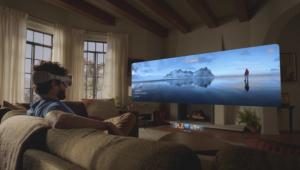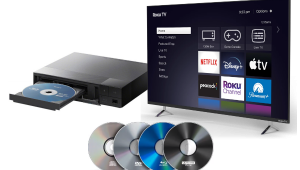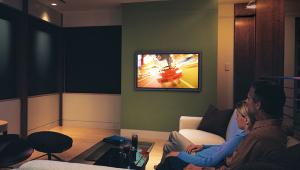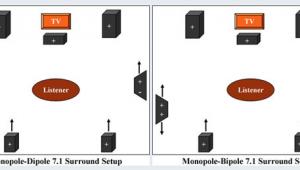I think it would be advantageous for either of these implementations of 3d.
Primary tabs
How Important is 4K in the Home?

Then there's the issue of 4K content, which I believe won't be available for distribution to the home for quite some time, if ever. Yes, we might see 4K-capable media in the next year or two—for example, BDXL optical discs and RedRay servers—but the studios give relatively few movies the full 4K treatment, and I bet those same studios will be loath to release movies for the home market at 4K. Until they do, owners of 4K displays will be limited to upscaled 1080p, which isn't all that much sharper than the original and carries the risk of scaling artifacts.
So I wonder how important 4K really is in the home? What do you think?
Vote to see the results and leave a comment about your choice.
- Log in or register to post comments


For me the jury is still out on if 4k has a place at home until I see a 4k panel. I have seen 4k cinema projectors on huge screens from really close that had phenomenal picture quality. I do not know how a 4k panel would look compared to a 1080 panel from a normal viewing distance. I'm sure it would allow closer seating but is that very practical in a home theater where you must place seating far enough away from your left, center, and right speakers to image correctly? That's usually 8-10 feet so maybe not. I'll have to wait and see for myself. I do think passive 3d sets could benefit from 4k displays though.

4K is important in the home only because it's the only way it can take off. At the end of the day the consumer decides what stays and what goes, but 4K is about to fight a very hard battle. The problem I see with the introduction of 4K right now is that we can't even do a decent job with 1080p. People still don't have a clue on how to set up their TVs properly. Most people don't even know what a grey scale calibration is. Not only TV station compress the crap out of the content, they don't even do 1080p. What's even worse, consumers are getting most of their content online, and we know how crappy that is. So, what will 4K do for these people? Let's be honest, a lot people think that they're watching HD content, even when they're tunned to a SD channel, only because they have an HDTV set. They can't tell that what they're watching is SD, and this happens a lot. There's a second group of consumers who aren't happy with their HDTV picture quality, but they don't realize the signal is not HD and they get stock watching SD thinking it's the way HD works. Consumers are not quality driven. Just look at the Kuro, it couldn't survive on picture quality alone. People couldn't justify the price tag, they didn't care about the quality of the product. This is why manufactures have started jamming tons of useless features into their gear, it's what sells. The thing is that 1080p shown in a well calibrated TV with a signal from a BluRay player can be really stunning, almost three dimensional. Unfortunately most people don't get to experience it. The only people who would take advantage of 4K are videophiles or people who care about picture quality. It will take TV networks a long time to adopt 4K, it might actually never happen. Networks were forced to buy HD equipment, some of them waited until the last minute to do it. It was a very expensive transition. Do you think they want to go thru that again? On the other hand, if 4K has a shot, it will be up to the consumer. But most won't get it because of what 4K really is, they'll get it because "more pixels are better." Companies can provide up-converted content and most consumers won't know the difference. Can you image what a 4K Netflix signal will look like? It'll be so compressed, and I'm not even touching the subject about bandwidth. This country is not ready for any kind of 4K distribution. 4K will probably start in a very niche market: high end projectors, and high end TVs; with content being up-converted internally. We know there's a market for high end projectors, but it's too small to make a format relevant. What about a high end TV market? If the Kuro couldn't make it, will a 4K TV make it?

I voted not important. But I wish it could have read Not Important... :-(
Do I want it to be important? Sure. The closer we can get to movie theater quality presentations in the home, the deader and more useless movie theaters will become. I hate movie theaters. No, I don't hate the *idea* of movie theaters. I've had some decent art-house movie theater experiences. But I DO hate all the actual new-release theaters that currently exist, their pricing structures, their outrageous concessions, the half hour of commercials, the cold temperatures, the unduly loud volumes, the unduly short times that movies stay in theaters, the other patrons, cell phones, laser pointers...... I think you get the idea.
But. And this is a big BUT...
There is just no way the studios will undercut their own business that way at any reasonable pricing rate or shipping volume. How will studios sell their content? Presumably, a 4k movie file will be in the 500gb to 1tb range. Will they sell it on a hard drive? Flash memory? How would they need to copy protect it? Will it be streaming? Frankly, none of these delivery methods is feasible or cost effective at this point. You'd be buying movies for $200, or have to have a T1 line going into your house to stream them. You're talking about a tremendous cost overhead just to get this movie into your home.
Then, there is the "format fatigue" issue. I just don't see studios, or CE manufacturers and retailers for that matter, pushing a new format after Blu-Ray's initially tenuous but finally solid roll-out.
I just don't think it's going to catch on. True videophiles are something of a niche group, which is why Blu-Ray took so long to get a foothold in the market. It just doesn't make sense as a business model to try and push 4k.

I think everyone has a vaild point that probably rings true, but i'm going to say we need it so we can get to a point we're we can have 3d tv and movie theaters with out glasses. I think I read somewhere that we would need something like a 50+ K to see 3d with on a tv with our normal eyes. Thank god I have an old pioneer elite that is getting me through all this 2k and remember when i first got it 6 years ago they actually played stuff on HD channels to show it off, nowadays we just dont see the high quaitly filming for tv broadcast we used to see i feel.

me and my friend was talking about this 4k tvs n more n he told me he is not giving his 1080p tvs n more up just because of this new 4k,then my friend has ask me what do i think of it.i have told my friend samething im not giving up on my 720p tv plus 1080p is top of line for me.1080p and 3d is best now but i wish i can have 3d set but i go to my friend home to watch 3d movies on his sets.

I personally would like to see 4K. I lean towards more detail based upon the projectors processing video with oversampling especially for motion at high (greater than 96) frames pers second. Oversampling allowed for noise-shaping and very flat frequency response when high-end CD players came out. I expect the same with 4Ks "2X" oversampling with a little anti-aliasing and high frame rates.
The screen will have to be much larger. Try connecting an HDMI-capable laptop to your 1080p TV and see how close you have to be in order to read text. Farther away than that and your eyes are the limiting factor. A 52 inch 4K display would be a waste of time except as a computer display. It would have almost the exact pixel density of a 24 inch 1920x1200 computer monitor.
I have an Epson 6100 projector, 17 feet from a 157 inch screen and I can easily see the SDE but I cannot say that I see the pixel structure. It's hard to find content that sharp except from my computer. I agree that most people will not use it to it's fullest extent. There's no content or computers that can output 4k, though Intel just announced that their next chipset will. We have all seen: stretched displays, obvious Std-Def being sent on HD channels un-cropped and friends watching cable TV from a yellow Composite cable.
Before you get too smug, ask yourself what's the difference between 1080i and 1080p... If you have been seeing "hi-def" only on flat panels the answer is likely nothing. They all convert everything you connect to them to the panels native resolution and field rate to fill the screen. In fact except for an old Hitachi Plasma, I haven't seen an actual blinky/comb "i" picture since I owned CRT based Proscan rear projector and Sony Wega 32 inch TVs.
Full-Resolution 3D would sure benefit. Whitness JVCs' "wabulation-like" effort. Also, a lot of movies are shot in 4K so this may actually be "as close as you can get to the theater experience".

Like most, if not all, of the other people who subscribe to Home Theater I am a cautiously optimistic ealy adopter of most technologies that permeate our hobby. However, at the risk of forum derision, I'm not in favor of 4K. The human eye simply cannot tell the difference on home-sized screens. Once you get to the realm of 103" screens, the difference is subtly noticeable. However, for any standard flat screen or smaller projection screen you're essentially spending money on a technology you won't reap any visual benefit from. As it is, many Blu-Ray transfers are less than ideal, so I would have to imagine that many studios will adopt less than favorable transfers simply for the purpose of milking the technology. What we would be left with is a technology of promise without the necessary capacities within the home to maximize its potential and less-than adequate media with which to view. There exists a critical mass when at some point you simply can't do any better. Given the average screen size of TVs and most projectors, 4k is not going to be worth it - blame the limitations of our visual acuity I suppose. I'm perfectly happy with 1080p.




































































